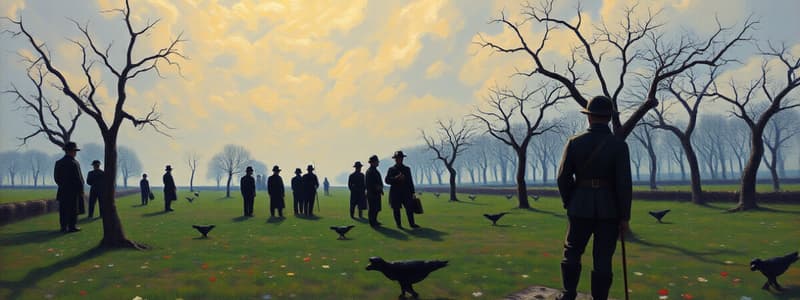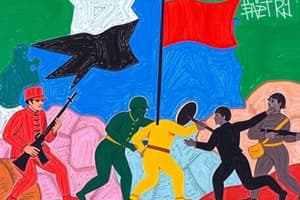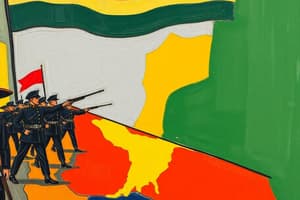Podcast
Questions and Answers
What are the causes of WWI represented by the acronym 'MANIA'?
What are the causes of WWI represented by the acronym 'MANIA'?
- Alliance Systems (correct)
- Militarism (correct)
- Nationalism (correct)
- Imperialism (correct)
- Assassination of Archduke Franz Ferdinand (correct)
How did militarism lead to WWI?
How did militarism lead to WWI?
The glorification of military power led to fear and suspicion as nations became more willing to use military force to attain their national goals.
How did alliance systems cause WWI?
How did alliance systems cause WWI?
Secret alliances were formed prior to the outbreak of the war, leading to nations protecting one another after the assassination of Franz Ferdinand.
How did imperialism cause WWI?
How did imperialism cause WWI?
How did nationalism cause WWI?
How did nationalism cause WWI?
What sparked WWI?
What sparked WWI?
Who was Gavrilo Princip?
Who was Gavrilo Princip?
What does genocide refer to?
What does genocide refer to?
What was the Armenian Massacre?
What was the Armenian Massacre?
What does 'The Sick Man of Europe' refer to?
What does 'The Sick Man of Europe' refer to?
What does the term 'Balkan Powder Keg' refer to?
What does the term 'Balkan Powder Keg' refer to?
What was the Triple Alliance?
What was the Triple Alliance?
What was the Triple Entente?
What was the Triple Entente?
Who were the Allied Powers in WWI?
Who were the Allied Powers in WWI?
Who were the Central Powers?
Who were the Central Powers?
What was the Schlieffen Plan?
What was the Schlieffen Plan?
What does the Eastern Front refer to in WWI?
What does the Eastern Front refer to in WWI?
What does the Western Front refer to in WWI?
What does the Western Front refer to in WWI?
What does stalemate mean in the context of WWI?
What does stalemate mean in the context of WWI?
Which weapon was most responsible for the stalemate on the Western Front during WWI?
Which weapon was most responsible for the stalemate on the Western Front during WWI?
What is trench warfare?
What is trench warfare?
What is trench foot?
What is trench foot?
Flashcards are hidden until you start studying
Study Notes
Causes of WWI
- Major contributing factors included Militarism, Alliance Systems, Nationalism, Imperialism, and the Assassination of Archduke Franz Ferdinand.
Militarism
- Glorification of military strength led to heightened fear and suspicion among nations.
- An arms race intensified, notably between Britain and Germany, as they expanded their militaries.
Alliance Systems
- Secret alliances were created before WWI, leading to various nations aiding each other post-assassination of Franz Ferdinand.
- Example: Russia protected Serbia against Austria-Hungary following the assassination.
Imperialism
- Competing for land, colonies, and resources caused tension among nations.
- The competition for raw materials was particularly intense between Great Britain and Germany.
- Austria-Hungary's control over Bosnia sparked Serbian nationalism.
Nationalism
- Strong nationalism in Germany and France fueled tensions, particularly over territory like Alsace-Lorraine.
- Pan-Slavism fostered Serbian nationalists' expectations for Russian support against Austria-Hungary.
Assassination of Archduke Franz Ferdinand
- The assassination by the Serbian nationalist group "Black Hand" triggered the outbreak of WWI.
Gavrilo Princip
- Identified as the Serbian nationalist who assassinated Archduke Franz Ferdinand.
Genocide
- Defined as a deliberate attempt to eliminate an entire religious or ethnic group.
Armenian Massacre
- Systematic extermination of Christian Armenians by the Ottoman Empire, resulting in 1.5 million deaths.
"The Sick Man of Europe"
- Term referring to the declining Ottoman Empire, beset by internal ethnic and religious conflicts.
"Balkan Powder Keg"
- The Balkans were characterized by turmoil and conflict, leading to the assassination of Archduke Franz Ferdinand.
Triple Alliance
- Military alliance among Germany, Austria-Hungary, and Italy prior to WWI.
Triple Entente
- Alliance formed between Great Britain, France, and Russia before the war.
Allied Powers
- Coalition of Britain, France, and Russia, later joined by Italy, the U.S., and others during WWI.
Central Powers
- Alliance consisting of Germany and Austria-Hungary, opposed to the Allies during the war.
Schlieffen Plan
- German military strategy for a swift attack on France via Belgium; faced resistance, leading to prolonged trench warfare.
Eastern Front
- WWI battlefield along the German-Russian border where Russians and Serbs engaged German and Austro-Hungarian forces.
Western Front
- Northern France battleground location where Allies and Central Powers faced off in trench warfare.
Stalemate
- Describes the deadlock experienced mainly on the Western Front, hindering military advances.
Key Weapon of Stalemate
- The machine gun was a significant factor contributing to the stalemate on the Western Front.
Trench Warfare
- Combat conducted from dugout trenches, characterized by harsh conditions including disease and lack of hygiene.
Trench Foot
- A debilitating condition caused by prolonged exposure to cold and wet environments in trenches.
Studying That Suits You
Use AI to generate personalized quizzes and flashcards to suit your learning preferences.




